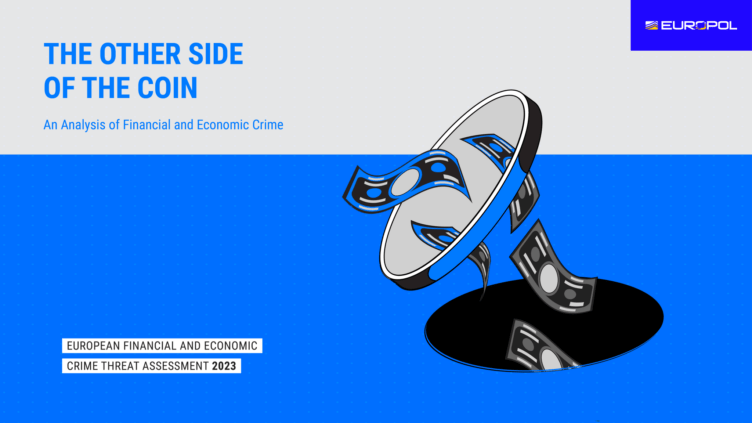EUROPOL Report: Money-Laundering Criminals Are Adapting To New Technology Faster Than Authorities Can Keep Up
By SCARS Editorial Team Society of Citizens Against Relationship Scams Inc., portions Europol
Money-Laundering Criminals Are Using New Technology Faster Than Authorities Can Keep Up
Criminals Are Washing Their Money Faster Than Authorities Can Track Them Down, According To A New Europol Report
The report found that 70% of criminal enterprises in Europe are using money laundering techniques to hide their wealth and assets. These criminals are mixing illicit finances with seemingly legal businesses and exploiting new technology to grow their operations and launder money faster than authorities can keep up.
In an increasingly interconnected world driven by trade and technology, criminals are leveraging modern advancements to maximize their profits.
Catherine De Bolle, the executive director of Europol, emphasized in the report that organized crime has established a parallel global economic and financial system centered around activities such as money laundering, illicit financial transfers, and corruption. The ability to launder (money laundering) illegal proceeds on a large scale, navigate complex networks of criminal financial intermediaries, and corrupt relevant individuals has become essential for modern organized crime.
The report’s authors warn that the increasing speed of deception is outpacing authorities and that criminals are increasingly using modern advances to profit.
“Organised crime has built a parallel global criminal economic and financial system around money laundering, illicit financial transfers and corruption,” Europol Executive Director Catherine De Bolle wrote in the report.
“The ability to launder illicit proceeds on an industrial scale, to move them through a web of criminal financial brokers, and to corrupt the relevant actors, has become indispensable for modern organised crime.”
The report’s findings are concerning, as money laundering can have a negative impact on the economy by undermining financial stability and reducing trust in the financial system. It can also lead to increased crime, as criminals use their laundered money to fund further criminal activity.
Authorities need to find new ways to keep up with criminals and track down their illicit proceeds. This could involve using new technologies to monitor financial transactions and identify suspicious activity. It could also involve working more closely with other countries to share information and coordinate investigations.
What is Money Laundering?
Money laundering by transnational organized criminal enterprises is a sophisticated process designed to obscure the illicit origins of unlawfully obtained funds and integrate them into the legitimate financial system. This complex and clandestine operation involves a series of intricate steps that enable criminals to legitimize their ill-gotten gains while evading detection by law enforcement agencies.
At its core, money laundering seeks to transform “dirty money” into “clean money” by giving it the appearance of legitimate wealth. It typically begins with the placement of illicit funds into the financial system, often through methods like bank deposits, currency exchanges, or purchases of valuable assets. To avoid raising suspicion, criminals often break down large sums into smaller transactions to stay under the radar.
Once the funds are “placed,” the next phase is “layering.” This involves a convoluted series of transactions meant to obscure the money’s origin. Criminals may transfer the money between various accounts, convert it into different currencies, or invest it in legitimate businesses. This complex web of transactions creates a labyrinth for investigators, making it challenging to trace the funds back to their criminal source.
The final stage, “integration,” aims to make the money appear fully legitimate. Criminals invest it in legitimate assets such as real estate, businesses, or stocks, making it challenging for authorities to distinguish between lawful and illicit funds. This integration into the legal economy allows criminals to enjoy the profits of their illegal activities without attracting undue attention.
Transnational organized criminal enterprises excel at money laundering due to their global reach, access to sophisticated financial tools, and the ability to exploit regulatory gaps in various jurisdictions. They often use a network of intermediaries, shell companies, and professional enablers to facilitate the laundering process, making it even more challenging for investigators to dismantle their operations.
Money laundering by these criminal enterprises poses significant threats to the global financial system, erodes trust in institutions, and fuels further criminal activities. It requires a concerted effort by law enforcement agencies, financial institutions, and international cooperation to combat this pervasive and evolving threat effectively.
EUROPOL “The Other Side of the Coin” Report
Serious and organised crime continues to threaten the internal security of the EU.
The criminal landscape constantly evolves, as criminals seek out new opportunities and exploit crises for their own interests. Criminal actors involved in economic and financial crimes are highly adept at taking advantage of our economy for their purposes, and at targeting increasing numbers of victims. They capitalise on vulnerabilities in society’s systems to generate billions in illicit profits, while applying various strategies, often cyber-enabled, to remain undetected and secure their earnings.
Financial crimes, and in particular money laundering, undermine our society not only by infiltrating the legal economy, but also by fostering the growth of a parallel underground society made of individuals who increasingly rely on organised crime for their economic sustenance and livelihood. Vulnerable demographics, and especially vulnerable youngsters who are lacking trust in societal institutions and confidence in the rule of law, are the perfect target pool for such parallel underground society.
Due to their intrusive nature, financial and economic crimes are among the most challenging criminal activities to investigate and tackle. A fragmented landscape sees different criminal actors interact with one another, making criminal operations more complex and tangled. Key players typically remain anonymous and operate independently from established criminal structures, often from criminal safe havens.
Meanwhile, their techniques and tools advance rapidly.
Some recent investigations, including those exploring encrypted communications among criminals, gave unprecedented insight into the system that sustains the
finances of organised crime. While law enforcement is untangling the complexity of this underground financial ecosystem, information sharing, investigative focus on key criminal actors, development of technical knowledge and expertise, and public-private partnerships are essential tools for winning the fight against financial and economic crimes.
The European Financial and Economic Crime Threat Assessment describes the complexities of financial and economic crimes, and the criminal ecosystem that
virtually sustains and links all other criminal activities. The report analyses all financial and economic crimes affecting the EU, such as money laundering, corruption, fraud, intellectual property crime, and commodity and currency counterfeiting.
It also illustrates the power of asset recovery in the fight against financial and economic crimes.
The analytical findings of this report rely on a combination of operational insights and strategic intelligence contributed to Europol by EU Member States and Europol’s partners, who provided crucial information regarding the criminals’ business models.
The report is intended to capture the pervasiveness and destructiveness of financial and economic crimes affecting the EU, and to support all relevant stakeholders in untangling the large variety of financial and economic crimes.
Continue Below …
The Other Side of the Coin
An Analysis of Financial & Economic Crime
Europol’s European Financial & Economic Crime Threat Assessment 2023
More ScamsNOW.com Articles
-/ 30 /-
What do you think about this?
Please share your thoughts in a comment below!
SCARS LINKS: AgainstScams.org RomanceScamsNOW.com ContraEstafas.org ScammerPhotos.com Anyscam.com ScamsNOW.com
reporting.AgainstScams.org support.AgainstScams.org membership.AgainstScams.org donate.AgainstScams.org shop.AgainstScams.org
youtube.AgainstScams.org linkedin.AgainstScams.org facebook.AgainstScams.org
TABLE OF CONTENTS
CATEGORIES
![NavyLogo@4x-81[1] EUROPOL Report: Money-Laundering Criminals Are Adapting To New Technology Faster Than Authorities Can Keep Up](https://scamsnow.com/wp-content/uploads/2025/04/NavyLogo@4x-811.png)
ARTICLE META
Important Information for New Scam Victims
- Please visit www.ScamVictimsSupport.org – a SCARS Website for New Scam Victims & Sextortion Victims.
- SCARS Institute now offers its free, safe, and private Scam Survivor’s Support Community at www.SCARScommunity.org – this is not on a social media platform, it is our own safe & secure platform created by the SCARS Institute especially for scam victims & survivors.
- SCARS Institute now offers a free recovery learning program at www.SCARSeducation.org.
- Please visit www.ScamPsychology.org – to more fully understand the psychological concepts involved in scams and scam victim recovery.
If you are looking for local trauma counselors, please visit counseling.AgainstScams.org
If you need to speak with someone now, you can dial 988 or find phone numbers for crisis hotlines all around the world here: www.opencounseling.com/suicide-hotlines
Statement About Victim Blaming
Some of our articles discuss various aspects of victims. This is both about better understanding victims (the science of victimology) and their behaviors and psychology. This helps us to educate victims/survivors about why these crimes happened and not to blame themselves, better develop recovery programs, and help victims avoid scams in the future. At times, this may sound like blaming the victim, but it does not blame scam victims; we are simply explaining the hows and whys of the experience victims have.
These articles, about the Psychology of Scams or Victim Psychology – meaning that all humans have psychological or cognitive characteristics in common that can either be exploited or work against us – help us all to understand the unique challenges victims face before, during, and after scams, fraud, or cybercrimes. These sometimes talk about some of the vulnerabilities the scammers exploit. Victims rarely have control of them or are even aware of them, until something like a scam happens, and then they can learn how their mind works and how to overcome these mechanisms.
Articles like these help victims and others understand these processes and how to help prevent them from being exploited again or to help them recover more easily by understanding their post-scam behaviors. Learn more about the Psychology of Scams at www.ScamPsychology.org
SCARS INSTITUTE RESOURCES:
If You Have Been Victimized By A Scam Or Cybercrime
♦ If you are a victim of scams, go to www.ScamVictimsSupport.org for real knowledge and help
♦ SCARS Institute now offers its free, safe, and private Scam Survivor’s Support Community at www.SCARScommunity.org/register – this is not on a social media platform, it is our own safe & secure platform created by the SCARS Institute especially for scam victims & survivors.
♦ Enroll in SCARS Scam Survivor’s School now at www.SCARSeducation.org
♦ To report criminals, visit https://reporting.AgainstScams.org – we will NEVER give your data to money recovery companies like some do!
♦ Follow us and find our podcasts, webinars, and helpful videos on YouTube: https://www.youtube.com/@RomancescamsNowcom
♦ Learn about the Psychology of Scams at www.ScamPsychology.org
♦ Dig deeper into the reality of scams, fraud, and cybercrime at www.ScamsNOW.com and www.RomanceScamsNOW.com
♦ Scam Survivor’s Stories: www.ScamSurvivorStories.org
♦ For Scam Victim Advocates visit www.ScamVictimsAdvocates.org
♦ See more scammer photos on www.ScammerPhotos.com
You can also find the SCARS Institute’s knowledge and information on Facebook, Instagram, X, LinkedIn, and TruthSocial
Psychology Disclaimer:
All articles about psychology and the human brain on this website are for information & education only
The information provided in this and other SCARS articles are intended for educational and self-help purposes only and should not be construed as a substitute for professional therapy or counseling.
Note about Mindfulness: Mindfulness practices have the potential to create psychological distress for some individuals. Please consult a mental health professional or experienced meditation instructor for guidance should you encounter difficulties.
While any self-help techniques outlined herein may be beneficial for scam victims seeking to recover from their experience and move towards recovery, it is important to consult with a qualified mental health professional before initiating any course of action. Each individual’s experience and needs are unique, and what works for one person may not be suitable for another.
Additionally, any approach may not be appropriate for individuals with certain pre-existing mental health conditions or trauma histories. It is advisable to seek guidance from a licensed therapist or counselor who can provide personalized support, guidance, and treatment tailored to your specific needs.
If you are experiencing significant distress or emotional difficulties related to a scam or other traumatic event, please consult your doctor or mental health provider for appropriate care and support.
Also read our SCARS Institute Statement about Professional Care for Scam Victims – click here
If you are in crisis, feeling desperate, or in despair, please call 988 or your local crisis hotline – international numbers here.
More ScamsNOW.com Articles
A Question of Trust
At the SCARS Institute, we invite you to do your own research on the topics we speak about and publish. Our team investigates the subject being discussed, especially when it comes to understanding the scam victims-survivors’ experience. You can do Google searches, but in many cases, you will have to wade through scientific papers and studies. However, remember that biases and perspectives matter and influence the outcome. Regardless, we encourage you to explore these topics as thoroughly as you can for your own awareness.

























![scars-institute[1] EUROPOL Report: Money-Laundering Criminals Are Adapting To New Technology Faster Than Authorities Can Keep Up](https://scamsnow.com/wp-content/uploads/2025/04/scars-institute1.png)

![niprc1.png1_-150×1501-1[1] EUROPOL Report: Money-Laundering Criminals Are Adapting To New Technology Faster Than Authorities Can Keep Up](https://scamsnow.com/wp-content/uploads/2025/04/niprc1.png1_-150x1501-11.webp)